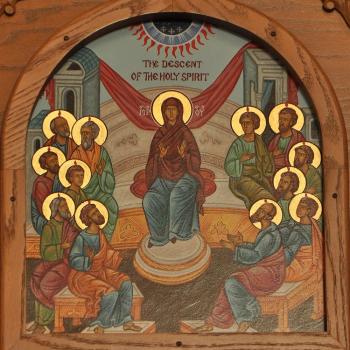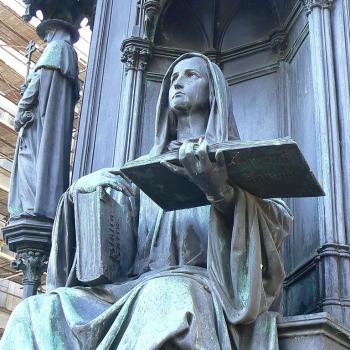
Whenever we dare to talk about God, we must keep in mind the incomprehensible nature of God. Whatever we say about God will ultimately fail to fully represent God. To anything which has been said about God, we can give an apophatic no, saying God is greater than that. Our words, at best, can only point to the great mystery of God. If we try to comprehend the infinite through the finite, the infinite will break through the bounds of the finitude and show them to be useless rubble. This is why, when we talk about God, we must employ words properly, using them as pointers to truths beyond themselves. We must always go with the spirit instead of the letter of what was said, for that way, we will not try to force the mystery of God to be confined within the limits of what human speech can or cannot say.
Since, when talking about God, words are pointers to truths beyond themselves, we must understand the context in which the words are being used. This will allow us to properly follow them and apprehend the truth intended by them. If we do not, we can easily lead ourselves astray and become confused when words are used differently in different contexts. It is like asking people around the world where Rome can be found; the response will depend upon where we are asking the question. If we start our inquiry to the north of Rome, our respondent would point to the south, while if we ask someone to the south of Rome, they will point north. If we travel around the world, asking the same question, and record all of the answers without indicating where we are at, it will appear that people are contradicting each other, but if we understand the context of each answer, we will be able to triangulate them and use them to find Rome. The same must be said when dealing with God: we must understand the context of the words being used and not just focus on the words themselves, otherwise we will misunderstand the answers given to us, thinking various answers contradict each other when they do not. We must understand theology will deal with antinomial paradoxes which transcend human logic. This is especially true when we are trying to discuss the Trinity. We have been shown the truth of the Trinity through revelation, but when we try to apprehend it with human words, those words fail. People will describe the Trinity in a variety of ways, pointing to the same truths but using words in different ways. We must try to understand what the great theologians intend with their words, see the spirit behind the words and not be stuck by the words themselves if we truly want to engage the Trinity and how it is explained in theology. Otherwise, we will end up making great saints and theologians, indeed, councils, contradict each other, as they often use the same words to mean different things [1]
The teaching of the Trinity tells us simply that God is found in three persons, described in Scripture as Father, Son and Holy Spirit. Each person is God, not a part of God. Each person is equal to each other, as each is fully God (for the divine nature is simple and incapable of being divided into parts). As God is eternal, each person of the Trinity is eternal. Nonetheless, there is a logical order within the Trinity, with the Father as being the “source and foundation” for the persons of the Son and the Holy Spirit. The Father is unoriginate, the Son is generated, and the Holy Spirit spirates, not in time, but in eternity. The generation of the Son is an eternal, non-ending begetting, and the procession of the Spirit is an eternal, never-ending procession.
One of the great mysteries in Trinitarian theology is the procession of the Spirit. What is it? What does it mean? It means the Spirit somehow comes from the Father, but not in a way in which the Spirit can be said to be a Son of the Father, that is, it is not begotten of the Father. And yet, as revelation suggests (in the way the Son sends the Spirit and the Spirit is said to be the Spirit of the Son), the procession of the Spirit is also connected with and related to the Son. It is one eternal procession, one spiration, but it is a spiration which comes from the Father and the Son together. Because the Son is begotten of the Father, the procession of the Spirit through the Son is tied with the Son’s generation from the Father. This is why, though we can see that the procession of the Spirit is connected to the Son, it can also be said to be a procession from the Father, pointing out that “monarchy” of the Father, that is, the foundation or logical beginning of the Trinitarian persons is found with the Father. Affirming the monarchy of the Father is a different but connected concern to the relations of the Trinitarian person. It is why, when talking about the procession of the Spirit from the Father as a way to confirm the monarchy of the Father does not tell us anything about the relation of the Spirit with the Son. Those who focus on the monarchy of the Father in their theology will discuss the procession of the Spirit from the Father; this is the intended meaning and goal; if we get stuck with the way the meaning is presented, to the words themselves, and they reify the words, we begin to tie down the divine nature to human constructs, and in doing so, establish a pale imitation of God.
To truly appreciate the Trinity, we must not become stuck with the words used to describe the Trinity, but rather, focus on what God reveals to us concerning the activity of the Trinity. This is through the economic activity of God. If we think the economic activity does not truly present to us truths about the immanent Trinity, then we will have to abandon the notion that God is revealed to us in the incarnation of the Son. This would be a major problem because it is in and through the Son we are shown the truth of the Trinity. In the economic activity of God, revealed in Scripture, we find that the Father is said to send the Spirit (cf. Jn 14:26) even as the Son himself is said to be the one who sends the Spirit (cf. Jn. 16:7). Saying the Spirit is sent by the Father does not undermine the fact that the Spirit is sent by the Son. The two work together in the sending of the Spirit, with the Father sending the Spirit through the Son. This should help us understand how the Spirit can be said to proceed from the Father as well as from and through the Son, for in the way we understand the way the Father and Son send the Spirit so that the Spirit can truly be said to be sent from the Father, so we can understand the procession of the Spirit from the Father while recognizing the Spirit proceeds from and through the Son.
Now, as we have said above, the monarchy of the Father often is represented by the way some talk about the procession of the Spirit as from the Father. Thus, St. John of Damascus wrote: “And only the Holy Spirit proceeds; not begotten, but proceeding from the substance of the Father.”[2] The Son is likewise from the substance of the Father, being begotten of the Father before all worlds. So, what comes from the Son likewise would be from the substance of the Father. Thus, by pointing to the Father in this fashion, we are reminded that the Father is the source and foundation of the Trinity; it is the divine nature, the substance of the Father, which is being shared by all. This is what must be understood when the various patristic authors talk about the Spirit proceeding from the Father, and indeed, when they speak of the Spirit as coming from the Father but not the Son: they are talking about the Father as being the logical origin or foundation for the Divine Trinity. With this as our context, we can understand John of Damascus when he said:
And we do say that the Holy Ghost is of the Father and we call Him the Spirit of the Father. Neither do we say that the Spirit is from the Son, but we call Him the Spirit of the Son — ‘Now if any man not the Spirit of Christ,’ says the divine Apostle, ‘he is none of his.’ We also confess that He was manifested and communicated to us through the Son, for ‘He breathed,’ is says, ‘and he said to his disciples: Receive ye the Holy Ghost.’ It is just like the rays and brightness coming from the sun, for the sun is the source of its rays and brightness and the brightness is communicated to us through the rays, and that it is which lights us and is enjoyed by us. Neither so we say that the Son is of the Spirit, nor, most certainly, from the Spirit. [3]
Great care must be had when reading this passage. We must not get lost in the subtle distinctions involved and use the text to say more than it does about the Trinity. The Holy Spirit is said to be from the Father (as the source and origin of the Trinity, giving the rest of the Trinity its substance, which is his) and of the Father, but not from the Son (since the substance of the Son is not from the Son but from the Father). Nonetheless, John indicates there is some relationship between the Son and the Holy Spirit because the Spirit is the Spirit of the Son even as it is the Spirit of the Father. That is, the Holy Spirit is the Spirit of the Father and the Spirit of the Son, or simply, of the Spirit of the Father and the Son. What does it mean to be the Spirit of the Father and the Son? To have its spiration from the Father and the Son. For the Spirit would not be “of the Son” if it did not proceed from the Son. It would simply be the Spirit of the Father if its procession is solely from the Father. Thus, when we read in the economic revelation of the Holy Spirit that it is sent by the Father and the Son, we have the way to understand the spiration of the Spirit: it is from the Father and through the Son, even as the Spirit is sent by the Father and to us through the Son.
This is where our words make discussion of the Trinity difficult, for we must at once affirm the monarchy of the Father with the fact that the Spirt is the Spirit of the Son. Just as when Jesus said the Father sends the Spirit did not undermine Jesus’ own role in the sending of the Spirit, so talking about the procession from the Father without mentioning the Son does not undermine the role of the Son in the Spirit’s spiration. For, as indicated above, just as we can understand how the Son sends the Spirit in and through the sending of the Spirit from the Father does not make for two but one sending of the Spirit between the two of them, so we can understand the procession of the Spirit from the Son is one with the procession of the Spirit from the Father. It is not another spiration. There is one eternal spiration of the Spirit, even as there is one eternal begetting of the Son. The begetting of the Son is eternal, outside of time, without any before or after. Likewise, the spiration of the Spirit is eternal, without a before or after. It all happens in the one eternal act of God: “However, the begetting of the Son and the procession of the Holy Ghost from the Father are simultaneous.” [4] And, understanding this, John of Damascus says the Holy Spirit is joined to the Father through its relationship with the Son, making it the median between the two (joining the two together):
The Holy Ghost is God. He is the median of the Unebegotten and the Begotten and He is joined with the Father through the Son. He is called the Spirit of God, Spirit of Christ, Mind of Christ, Spirit of the Lord, True Lord, Spirit of adoption, freedom, and wisdom – for He is the cause of all these. [5]
How does the Spirit act as a median? By the way the Spirit connects with the Father and the Son in and through its procession from the two; if there were not a shared single procession of the Spirit from the Father and the Son, it would not be joined to the Father through the Son but only to the Father. And if the Spirit is joined only to the Father, not only would it not be the Spirit of the Son, it would be even more difficult for us to describe the procession of the Spirit as not being another begetting, for what difference would there be between the generation of the Son and the spiriation of the Spirit? Thus, when we see that the Spirit is the Spirit of the Son (and not the reverse, the Son is not the Son of the Spirit), we see that the Spirit’s procession relates to the Son, even as it is the Spirit of the Father and so relates to the Father. St. Athanasius, in his writings on the Spirit, relied upon this relationship in order to defend the divinity of the Holy Spirit. He said that there is an order to the Trinity which points out that the Son is from the Father, while the Spirit is from the Son and the Father: “Seeing that there is such an order and unity in the Holy Trinity, who could separate either the Son from the Father, or the Spirit from the Son or from the Father himself?” [6] This ordering allowed him to suggest that just as the Son is the image of the Father, so the Spirit is image of the Son, which is why it can be said to be the Spirit of the Son:
The Spirit is said to be and is the Image of the Son. For those whom he foreknew he also predestined to be conformed to the Image of his Son [Rom 8.29]. Therefore, if our opponents confess that the Son is not a creature, it is impossible for his Image to be a creature. For an image must be just like that of which it is an image. Hence the Word is suitably and appropriately confessed not to be a creature, since he is the Image of the Father. [7]
Thus, the Spirit, as the Spirit of the Son, is connected with the Father through the procession of Spirit through the Son. To undermine the relationship between the Spirit and the Son is to undermine the Trinity:
For even if on account of the unity of the Word with the Father they do not wish the Son to be one of the things that have come into existence, but – as is truly the case — they think that he is the Creator of things that are made, why do they say that the Holy Spirit, who has the same unity with the Son as the Son has with the Father, is a creature? Why hasn’t it dawned on them that, just as by not dividing the Son from the Father they preserve the unity of God, so too, by dividing the Spirit from the Word they no longer preserve the divinity in the Trinity as one, but rupture it, and mix with it a nature that is foreign to it and different in kind, and reduce it to the level of creatures? [8]
The Spirit is not to be divided from the Son, and the Son is the Word of God. St. John of Damascus agreed with this, as he pointed out just as our words need breath, so the Word of God always has the Holy Spirit. “It is further necessary that the Word have a Spirit. Thus, even our ow speech is not devoid of breath, although in our case the breath is not of our substance.”[9] In stating it this way, we can see further how the Holy Spirit is the Spirit of the Son, the Spirit of the Word, for it goes forth from the Word even as our speech has breath come out with it.
The order of the Trinity reveals itself when we realize the Spirit is the Spirit of the Father and of the Son. However, some might ask, does this not undermine the monarchy of the Father? No, because we must still keep in mind all that the Son has is from the generation of the Father, so the procession of the Spirit from the Son is tied with the generation of the Son from the Father. “And it is quite remarkable that, just as the Son says: all that is mine is the Father’s [Jn. 17.10], so too is the Holy Spirit, who is said to be the Son’s, also the Father’s.” [10] The Spirit is the Spirit of the Son, and so “belongs” to the Son, but it “belongs to the Son” in the way the Son receives all things from the Father:
And you will find in every passage of Divine Scripture that the Holy Spirit, who is said to be the Son’s, is also said to be God’s: this is precisely what we wrote in our previous letter. Hence, if the Son is not a creature because he is the proper offspring of the Father’s substance, but is the same as the Father in substance, then likewise the Holy Spirit is not a creature – indeed, whoever says such a thing is impious! – because of the way in which the Spirit belongs to the Son, and because he is given from the Son to all people and all that he has is the Son’s. [11]
When we receive the Spirit, therefore, we receive the Word (as the Spirit is the Spirit of the Son) and also the Father (as the Son is the Son of the Father, and the Spirit is the Spirit of the Father through the Son):
The gifts which the Spirit distributes to each are bestowed by the Father through the Word. For all that the Father has is the Son’s. Thus what is given by the Son in the Spirit is a gift of the Father. And when the Spirit is in us, the Word who gives the Spirit is in us, and the Father is in the Word. [12]
The distribution of the gifts of the Spirit in the economia of the Trinity reveals truths of the immanent Trinity. It shows us that we have the Father through the Son, and the Son through the Spirit. We find the Spirit is the Spirit of the Son, for it comes to us from the Son. It is sent to us by the Son, though it is sent to us by the Son through the sending of the Spirit from the Father. Likewise, then, the procession of the Spirit from the Son is not other than the procession of the Spirit from the Father because all that the Son does, is said to be done in and through the Son’s relationship with the Father:
The Spirit, who is said to be of God and is in God, is foreign neither to the nature of the Son nor to the divinity of the Father. Thus there is in the Trinity – in the Father, and in the Son, and in the Spirit himself – one divinity, and in the same Trinity there is one baptism and one faith. Indeed, when the Father sends the Spirit, it is the Son who breathes upon his disciples and gives the Spirit to them. For all that the Father has is the Son’s [Jon. 16:15]. [13]
The sending of the Spirit represents the economic form of the procession of the Spirit. All that the Father has is the Son’s. The Father sends the Spirit, and the Son gives us the Spirit. It is sent by the Father and the Son, nonetheless, we can see the Father’s initiative in the sending of the Spirit described by the way Jesus talks about the sending of the Spirit from the Father. Thus, what we learn from the economic activity of the Trinity still affirms the monarchy of the Father. The initiative of the sending of the Spirit comes from the Father, and so the economic Trinity reveals to us the Father as the source and foundation of the Trinity, even as the sending of the Spirit through the Son shows to us the procession of the Spirit is not just of the Father but of the Son as well. The Spirit truly is the Spirit of the Son. The problem in describing the Trinity is that we want to engage the personal relations of the Trinity in ways which reflect temporality, but when we do so, we undermine the relations for they are eternal, not temporal. The origin of the Trinity in the Father does not undermine the procession of the Spirit from the Son, but rather, is affirmed by it when we realize all that the Son has is of and from the Father. This is why St. Augustine, in describing the filioque, described the procession of the Spirit from the Son as being a gift of the Father to the Son. The procession from the Son only demonstrates to us it is the Spirit of the Son; if there were a time in which the Spirit of the Son is not the Spirit of the Son, but only of the Father, then we can say there was a time in which the Spirit does not proceed from the Son, however, because there is no time in the Trinity, and the generation of the Son and the procession of the Spirit are simultaneously, then the Spirit is eternally the Spirit of the Son and so proceeds from the Son in eternity it proceeds from the Father as the eternal source and foundation of the whole Trinity.
[1] For example, Nicea originally said that the Son must not be understood as a different ousia or hypostasis to the Father. If we are limited to the words used at Nicea, then we must condemn later theologians when they describe the Son as a different hypostasis from the Father, but if we understand the way hypostasis was understood at Nicea and the way its meaning developed so that it could be used to distinguish the members of the Trinity, we will find that there is no real contradiction involved.
[2] St. John of Damascus, “On the Orthodox Faith” in Writings. Trans. Frederic H. Chase, Jr (New York: Fathers of the Church, Inc., 1958), 182.
[3] St. John of Damascus, “On the Orthodox Faith,” 188.
[4] St. John of Damascus, “On the Orthodox Faith,” 184.
[5] St. John of Damascus, “On the Orthodox Faith,” 200.
[6] St. Athanasius, “Letter One to Serapion” in Works on the Spirit: Athanasius the Great and Didymus the Blind. Trans. and intr. Mark DelCogliano, Andrew Radde-Galllwitz and Lewis Ayres (Crestwood, NY: St. Vladimir’s seminary Press, 2011), 84.
[7] St. Athanasius, “Letter One to Serapion.”, 91.
[8] St. Athanasius, “Letter One to Serapion,” 55.
[9] St. John of Damascus, “On the Orthodox Faith,” 174.
[10] St. Athanasius, “Letter Two to Serapion” in Works on the Spirit: Athanasius the Great and Didymus the Blind. Trans. and intr. Mark DelCogliano, Andrew Radde-Galllwitz and Lewis Ayres (Crestwood, NY: St. Vladimir’s seminary Press, 2011), 118-19.
[11] St. Athanasius, “Letter Two to Serapion,” 119.
[12] St. Athanasius, “Letter One to Serapion,” 100.
[13] St. Athanasius, “Letter Three to Serapion” in Works on the Spirit: Athanasius the Great and Didymus the Blind. Trans. and intr. Mark DelCogliano, Andrew Radde-Galllwitz and Lewis Ayres (Crestwood, NY: St. Vladimir’s seminary Press, 2011), 132.
Stay in touch! Like A Little Bit of Nothing on Facebook.
If you liked what you read, please consider sharing it with your friends and family!













